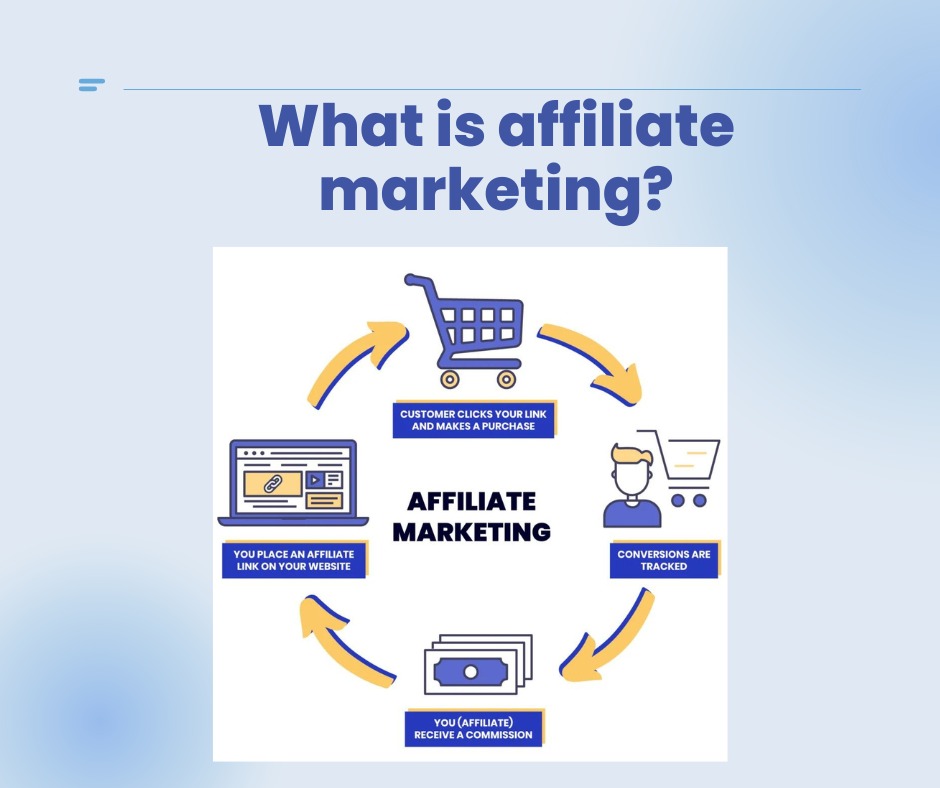Affiliate marketing promotes a product or service the business offers. This commission can be a percentage of the sale or a flat fee, which the business pays to the affiliate.

How affiliate marketing works?
Affiliate marketing works by having three main parties:
- The advertiser (the business offering the product or service).
- The publisher (the affiliate promoting the product or service).
- The consumer (the customer who makes a purchase).
An advertiser creates a product or service:
The advertiser creates a product or service and offers it for sale. They also sign up for an affiliate program and provide affiliates with marketing materials, such as banners and links.

Publisher promotes the product:
The publisher, also known as the affiliate, promotes the advertiser’s product or service through their own marketing channels, such as their website, blog, or social media accounts.
Customer clicks on the affiliate’s link:
The customer clicks on the affiliate’s unique referral link, which takes them to the advertiser’s website. The affiliate program tracks the link, so the affiliate earns a commission if the customer makes a purchase.
Types of affiliate marketing
There are several types of affiliate marketing, including:
Pay-per-sale:
The affiliate earns a commission for each sale made due to their marketing efforts.
Pay-per-lead:
The affiliate earns a commission for each lead they generate, such as a customer for a newsletter.
Pay-per-click:
The affiliate earns a commission for each click on their referral link, regardless of whether the customer makes a purchase.
Pay-per-impression:
The affiliate earns a commission for each impression of an advertisement, such as a banner ad on their website.
Cost-per-action (CPA):
The affiliate earns a commission for a specific action the customer takes, such as making a purchase or filling out a form.
Recurring commission:
The affiliate earns a recurring commission for each customer they refer, such as a subscription-based service.
• Unattached affiliate marketing
Unattached they can also known as naked affiliate marketing or stripped affiliate marketing, is a type of affiliate marketing where the affiliate promotes products or services without disclosing that they are receiving a commission for their promotion.
This is considered unethical by many in the industry and can also be illegal in some cases, depending on the laws and regulations in the affiliate’s country.

The affiliate does not include any disclosure in their marketing materials, such as a disclosure statement indicating that they are receiving a commission. This can mislead the consumer, who may believe that the affiliate is providing an impartial recommendation.
• Related affiliate marketing
Related affiliate marketing is a type of affiliate marketing where the affiliate promotes products or services related to the content on their website.
For example, if a website is focused on cooking and recipes, the affiliate might promote kitchen appliances, cooking tools, and recipe books.
This type of affiliate marketing is effective because it provides value to the website’s visitors by offering relevant products or services that they are likely to be interested in.
Pros and cons of affiliate marketing
Affiliate marketing has several pros and cons to consider. Some of the benefits of marketing include the following:
Pros:
- Increased reach: they can help businesses reach new customers through the marketing efforts of affiliates.
- Cost-effective: Marketing is often more cost-effective than traditional advertising, as the business only pays for results.
- Access to niche audiences: They can allows businesses to tap into niche audiences through the marketing efforts of affiliates who specialize in those areas.
- Increased brand awareness: They can increase brand awareness by reaching new audiences and building relationships with affiliates.
Some of the drawbacks include the following:
Cons:
Lack of control:
Businesses need more control over affiliates’ marketing messages and techniques.
Competition:
Affiliate marketing can be competitive, as multiple affiliates may promote the same product or service.
Quality control:
Businesses must monitor the quality of their affiliate program to ensure that affiliates promote their products and services ethically and effectively.
Commission disputes:
Disputes can arise over the amount of commission earned by affiliates, which can be time-consuming and costly to resolve.
How do affiliate marketers make money?
Affiliate marketers make money by promoting products or services and earning a commission for each sale or lead generated due to their marketing efforts.
The commission amount is typically a percentage of the sale price and may vary depending on the product or service being promoted and the affiliate program’s terms.

For example, an affiliate marketer might promote a product on their website and include a special referral link. the affiliate earns a commission on the sale.
The affiliate may also earn a commission for leads generated, such as when a customer fills out a form or signs up for a newsletter.
Some affiliate programs offer recurring commissions
Affiliate marketers may also earn money through cost-per-action (CPA) programs.
How to start affiliate marketing
Choose a niche:
Decide on a niche or area of interest to focus on and build your efforts around.
Build a platform:
Choose a platform to build your efforts on, such as a website or blog, social media, or email list. Make sure your platform reaches your target audience and allows you to promote products effectively.
Find affiliate programs:
Research affiliate programs that offer products or services in your niche.
Apply to affiliate programs:
Apply to the selected programs and wait for approval. Some programs may require you to provide information about your platform and audience, while others may have a simple sign-up process.
Create content:
Create high-quality content that promotes the products or services you are an affiliate for. Your content should provide value to your audience and encourage them to take action, such as making a purchase.
Promote products:
Promote the products or services you are an affiliate for through your platform, using your referral link. Use a variety of promotional tactics, such as social media posts, blog articles, and email marketing.
1. Pick your platform and method
- Choose your niche and focus on it
- Research and join affiliate programs
- Create valuable and engaging content
- Promote affiliate products through your platform using unique links
- Keep track of your progress and adjust your strategy as needed.
2. Decide your niche and audience
- Choose your niche and focus on it
- Research and join affiliate programs
- Create valuable and engaging content
- Promote affiliate products through your platform using unique links
- Keep track of your progress and adjust your strategy as needed.
3. Find your products
- Research and join affiliate programs that offer the products you want to promote
- Create valuable and engaging content that showcases the benefits of the products you are promoting
- Promote affiliate products through your platform using unique links
- Track your progress and adjust your strategy as needed
4. Choose your first affiliate program
- Sign up for the affiliate program and get your unique referral link
- Create valuable and engaging content that showcases the benefits of the products you are promoting
- Promote affiliate products through your platform using your unique links
- Track your progress and adjust your strategy as needed
Tips for affiliate marketing success
- Choose a niche that you are passionate about and that has the potential for profitability.
- Build a platform that reaches your target audience and allows you to promote affiliate products effectively.
- Research and join affiliate programs that offer high-quality products that align with your niche and target audience
- Create valuable and engaging content that showcases the benefits of the products you are promoting and provides value to your audience.
- Promote affiliate products through your platform using unique links.
- Use various methods to promote affiliate products, such as email marketing, social media, and blog posts.
- Keep track of your progress and adjust your strategy as needed.
- Stay up-to-date with the latest trends and best practices.
marketing program examples
- Amazon Associates
- Commission Junction
- ShareASale
- Rakuten Marketing
- Clickbank
- eBay Partner Network
- CJ Affiliate
- Avangate Affiliate Network
- FlexOffers
- Impact Radius.
Start your marketing business today.
Here are the steps to start your affiliate marketing business today:
- Choose a niche that you are passionate about and that has the potential for profitability.
- Build a platform (e.g., website, blog, YouTube channel) that reaches your target audience and allows you to promote affiliate products effectively.
- Research and join affiliate programs that offer high-quality products that align with your niche and target audience
- Create valuable and engaging content that showcases the benefits of the products you are promoting and provides value to your audience.
- Promote affiliate products through your platform using unique links.
- Use various methods to promote affiliate products, such as email marketing, social media, and blog posts.
- Keep track of your progress and adjust your strategy as needed.
- Stay up-to-date with the latest affiliate marketing trends and best practices.
FAQ
What is affiliate marketing?
Affiliate marketing is a performance-based marketing strategy where a business rewards affiliates for each customer or sale generated from their promotions. The affiliates promote the business’s products or services through unique referral links and earn a commission on any sales.
How do affiliates make money in affiliate marketing?
Affiliates make money by promoting products or services through unique referral links and earning sales commissions. The commission amount varies depending on the affiliate program and can range from a few percent to 50% or more of the sale price.
How do businesses benefit from affiliate marketing?
Businesses benefit from by reaching new customers through the promotions of affiliates. they can also help businesses increase brand awareness and drive more sales.
How do I choose the right affiliate program?
When choosing an affiliate program, it’s important to consider the products or services offered, the commission structure and payment terms, the reputation of the program, and the program’s rules and regulations. Choosing a program that aligns with your niche and target audience is also important.
What do I need to start affiliate marketing?
you need a platform to promote affiliate products (e.g., website, blog, YouTube channel), knowledge of the niche you want to target, and a way to reach your target audience.
You also need to research and join affiliate programs, create valuable content that showcases the benefits of the products you are promoting, and promote affiliate products through your platform using unique referral links.
What are the key success factors for affiliate marketing?
The key success factors for affiliate marketing include choosing a profitable niche, building a platform that reaches your target audience, joining high-quality affiliate programs, creating valuable and engaging content,tracking your progress, and staying up-to-date with the latest trends and best practices.



Add a Comment